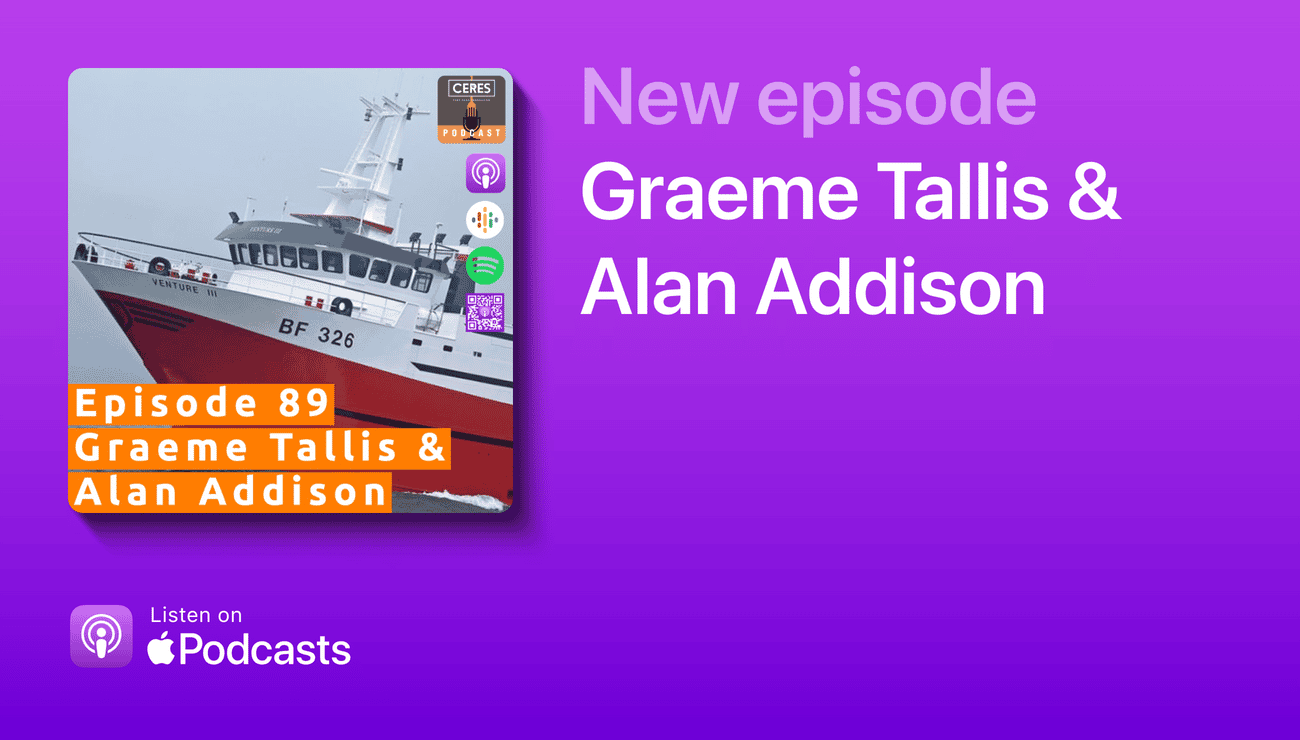Episode 89: Navigating the Storm - Scottish Seafood Insights from The Ceres Podcast
Posted by Emma on 27th Mar 2021 Reading Time:
Imagine standing on the rugged Scottish coast, the salty breeze in your hair, watching fishing boats bob on the horizon. Now, picture the stories behind every catch—the grit, the passion, and the unpredictable tides of an industry that feeds so many. That’s precisely what you’ll get in Episode 89 of The Ceres Podcast, hosted by the ever-curious Stelios Theocharous. This time, he’s joined by Alan Addison, skipper of Venture III, and Graeme Tallis of GT Seafoods, two northeast Scotland stalwarts who’ve spent decades turning fish into livelihoods. If you’re in hospitality—whether you run a fish and chip shop, a bustling restaurant, or a hotel kitchen—this episode is a goldmine of insights you won’t find anywhere else.
Stelios kicks things off by diving into the lives of these two industry veterans, both hailing from Buckie, a fishing town where the sea isn’t just a backdrop—it’s a way of life. Graeme shares how he built GT Seafoods from the ground up after a redundancy, turning it into a £7.5 million operation that supplies fresh fish across the UK and Europe. Alan, meanwhile, recounts his journey from apprentice crewman on his father’s boat to skippering Venture III, chasing monkfish and deep-water species across the North Sea. Their stories aren’t just personal—they’re a masterclass in resilience, adaptability, and the sheer hard work it takes to keep seafood on your tables.
What stands out most is how candidly they tackle the big issues shaking up the industry today—Brexit and COVID. Alan doesn’t mince words about Brexit’s broken promises: “I had no doubt European boats were still going to be allowed access in UK waters… it’s fish that nobody will ever catch.” He paints a grim picture of quotas so restrictive that boats land “dribs and drops” while Danish fleets scoop up tonnes nearby. Graeme adds a shore-side perspective, revealing how new export paperwork post-Brexit costs his business £50,000 a year—a burden hospitality buyers should note when sourcing Scottish catch. Yet, amidst the gloom, there’s ingenuity: Graeme’s workaround of setting up GT France in Boulogne to streamline shipments is the kind of problem-solving that keeps this industry afloat.
For hospitality folks, the episode’s real meat lies in the discussion about fish supply and consumer habits. Alan’s frustration is palpable when he says, “There’s no reason why a hotel anywhere in the UK should be using frozen fish.” It’s a wake-up call for chefs and owners—Scottish fish, caught fresh just miles from shore, is a premium product begging to be showcased. Graeme echoes this, pointing out how price volatility drives fish and chip shops to frozen-at-sea options: “They could take a pallet of frozen fish at a price… rather than £7 a kilo one day, £9 the next.” It’s a challenge but also an opportunity—a consistent supply could lock in local seafood as a staple on your menu.
The surprises don’t stop there. Have you ever heard of Tusk or Red Gurnard? Alan’s experiment with these lesser-known species, served at a local hotel, hints at untapped potential. “Tusk was better than monkfish,” he says, describing its meaty texture. It’s a nudge to diversify beyond cod and haddock, especially when stocks waver. Graeme doubles down, urging more promotion of species like coley and ling: “We’re sending them in a box direct to the continent.” Imagine the edge your business could gain by being the first to spotlight these hidden gems.
Seasonality gets a shout, too—something every kitchen should heed. Alan’s blunt advice? Don’t serve haddock in spring when it’s spawning and “wet.” Switch to hake or whiting instead. Practical wisdom could save you customer complaints and elevate your dishes. And then there’s the sustainability angle—not just about stocks, but food miles. Alan notes that Scottish boats travel 30 miles versus Norwegian fleets, clocking 300, a carbon footprint stat that could woo eco-conscious diners.
This episode isn’t all doom and gloom—it’s a love letter to Scottish seafood’s quality and potential. Graeme’s proud claim, “Scottish fish are the best out there,” isn’t bravado; it’s backed by decades of expertise. Yet, both men admit the industry’s at a crossroads, waiting for quotas to stabilise and hospitality to roar back. Their honesty—tinged with cautious hope—makes this a must-listen for anyone in the trade.
So, if you’re in hospitality looking to source smarter, cook bolder, or understand where your fish comes from, Episode 89 of The Ceres Podcast is your ticket. Stelios, Alan, and Graeme don’t just talk fish—they unpack an entire ecosystem of challenges and chances. Hit play, soak in their wisdom, and subscribe to catch more episodes that’ll keep your business ahead of the curve. Your next great dish might be a listen-away.


